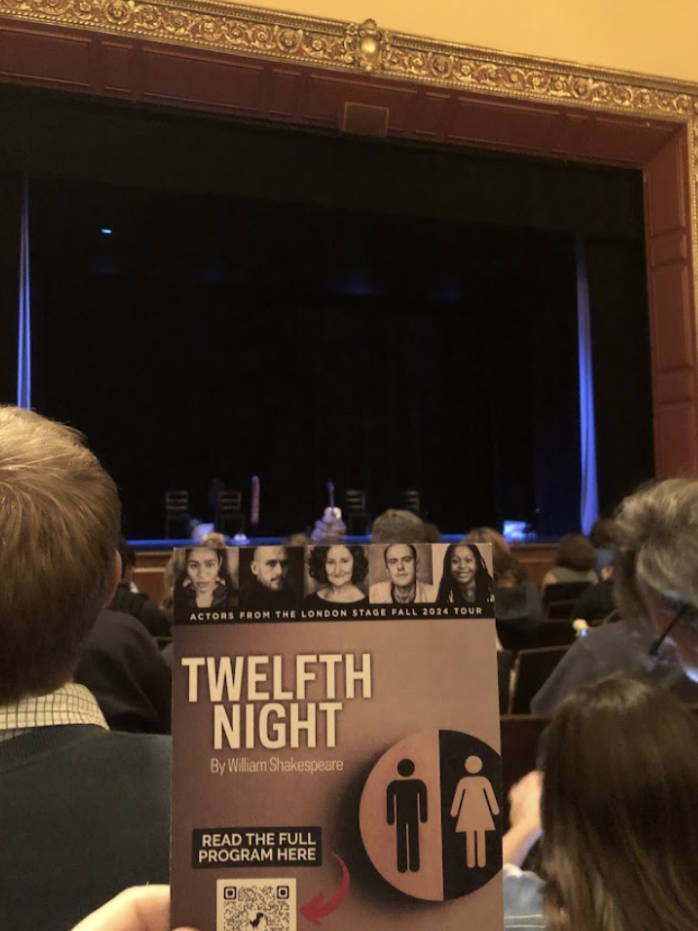When you see a production of William Shakespeare’s “Twelfth Night,” you might expect to see bouquets of roses, character disguises and hear lots of “thines,” “thous” and “dosts.” You might not expect to see at Wellesley College flossing (the dance move), a sign that says “box tree” and turns around to say “intermission” or the “Smells Like Teen Spirit” riff. It is these touches that brought this production into our modern times and engaged the audience in new exciting ways. By adapting Shakespeare, the Actors of the London Stage made the play accessible to new audiences just as Shakespeare’s audiences would have felt the play was relevant to them in their time.
From Sept. 26 to 29, during the Actors of the London Stage’s three-night run of “Twelfth Night,” Alumnae Hall Auditorium was filled with plenty of laughs and “awwws” from audience members (including us!). For those unfamiliar with the play, “Twelfth Night” begins when a woman named Viola washes up on the shore of a kingdom called Illyria and pretends to be a boy named Cesario to get a job in the court of Count Orsino. Enlisted by him to woo the object of his affections, Olivia, trouble ensues when Viola falls for Orsino and Olivia falls for Cesario (aka Viola).
In the production brought to Wellesley, the stage itself was quite sparse. There were no tricks of lighting and most notably, only five actors played all fourteen roles. Yet, the actors brought us a completely immersive experience with their skillful portrayal of each character. They adapted their body language and voice to each character so that the audience could tell who they were playing. Additionally they used props skillfully like flowers for the members of Count Orsino’s court or a dish towel for Maria. Shona Babayemi, who played both Olivia and her servant Maria, brought the enthusiastic romance and mischief. Olivia spoke with a low voice, but let her giddiness show when thinking about Cesario, her crush. Meanwhile, Babayemi used a brighter pitch when playing Maria because she was often working on her pranks on other characters. Meanwhile, Thuliswa Magwaza, who played Viola/Sebastian, brought emotion to the play through tears and her incredible vocals. Sarah Finigan, who took on the roles of Toby Belch and Antonio, was drunken aplomb and played a mean recorder. When playing Antonio she was a lot more serious and wore a single arm of tattoos. Meanwhile, when embodying Sir Toby, she completely switched in volume and mannerisms. She took swigs from the flask she held or drunkenly strode across the stage. Sam Jenkins-Shaw in his role of Orsino and Feste brought the royal air and the fool’s comedy to life. In one scene he toggled between the noble Orsino and the riddling Fool switching off between a rose in his shirt pocket and a clown nose on his face. It was these little touches for each character that brought the characters to life and allowed the audience to get lost in the magic of the theater.
By the end of the play, we were cheering for Viola and her marriage to Orsino and Olivia’s marriage to Sebastian. We wondered at Antonio’s fate alone and revel in the final song of Feste during which each character joined in for the final verse. If we had any qualms about the production, it was this: we wished the actors had played up the complex feelings between Viola and Orsino to a greater degree –– specifically when Viola is dressed as Cesario. For most of the play Cesario/Viola is forced to be Orsino’s messenger to Olivia while hiding her own love for him. However, there are moments where it can be construed that Orsino reciprocates these feelings, but is trapped in a heteronormative society that pairs him with Olivia. However, in this production, the ambiguity and possible romance was not as played up as much as it could be. Therefore, it seemed like a surprise when Orsino so readily married Viola when he realized she was a woman. That way, it might have been less surprising when the two end up together. On the other hand, the love between Toby and Maria shone brightly throughout the play. They bantered with each other and gave each other loving glances as they planned out the pranks of the play. Of course, it’s Shakespeare: not everyone ends up happily married at curtain’s close. Malvolio, incredibly played by actor Hayden Wood, stole our hearts like no other characters were able to.
Wood’s performance of Malvolio was unforgettable –– and perhaps a little too relatable. Wood brought comic relief through his multiple characters: Olivia’s steward named Malvolio who is a grump and a victim of multiple pranks by Sir Toby and Maria and Sir Andrew who is Sir Toby’s goofy benefactor. The subject of ridicule due to his crush on Olivia (God forbid you’re an essential worker with a crush … ), Malvolio dons neon yellow mesh and swim trunks after receiving a fake love letter from Olivia. But who hasn’t done something ridiculous for love? Sir Andrew — Wood’s drunken and hilarious foil –– is rarely in on the joke either, but he certainly won our admiration with his silly one-liners and Fortnite-inspired dance moves.
“Twelfth Night” presented by the lovely actors of the London Stage was a delight for Shakespeare and non-Shakespeare fans alike. We laughed, teared up and cheered for love –– at Wellesley and beyond. We can hardly wait for the thrilling season of theater ahead.
Contact the editors responsible for this story: Ivy Buck, Norah Catlin



